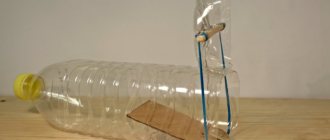Gardens and vegetable gardens are a good help both in terms of food and in terms of relaxation for the soul. But everything that is grown on personal plots faces many dangers - beetles, larvae, birds, moles. And if chemicals help fight plant diseases or insect pests, then it is best to scare away birds and moles from the site, rather than destroy them. A primitive design will help with this - a windmill made from a plastic bottle, made with your own hands from scrap materials.
Waste material goes to work
Many, many different useful crafts can be made from so-called waste material. It’s also easy to get useful things for your garden plot and vegetable garden by applying your imagination and skillful hands to seemingly unnecessary things. Many different options for bird and mole repellers can be seen in various sources, some of them are quite complex, and some are primitive. It’s worth starting to create with the simplest designs. Plastic bottles, scraps of polyethylene pipes, a broken handle from a house mop, a used welding electrode, gift ribbons from already unwrapped gifts, toy bells or drink cans - anything can be used.
The effectiveness of homemade scarecrows
Outwardly, moles look like cute and harmless animals. But at the same time, they can cause significant harm to the garden plot. Moles by nature are blind animals. Thanks to this, their hearing is highly sensitive.
Attention! Taking into account the special influence of sounds, the irritating effect of homemade devices is much more effective than in cases with other animals.
Accurate determination of the permanent habitat can be difficult because the family has several exits from the burrow. Therefore, determining its location is not easy. The task is further complicated by the fact that the depth of the hole can reach several meters. As a result, the right solution is to make homemade turntables from available or scrap materials.
Design Basics
It is no coincidence that a device for scaring away birds or moles from a site has a very specific name “windmill”. The main force that makes the structure perform its function is the wind. The wind is blowing - the windmill is working. In order for such a repeller to work, it needs to catch air currents, which means it needs blades. If you set a goal, then making a windmill from plastic bottles with your own hands is quite simple. The most important part - the blades - is cut out of plastic. Moreover, the blades from the bottle will not need to be attached, because they are cut in place and simply bent. The remaining design elements will depend on the purpose of the windmill. Tools you will need for work:
- stationery knife;
- scissors;
- universal glue;
- hard wire;
- beads with a hole for wire;
- self-adhesive film or colored electrical tape.
Less humane means:
- chemicals (chemicals) - sold in gardening stores;
- special mechanical wing traps. They operate similarly to mousetraps. Bait is placed inside. The mole enters the trap and remains there. Usually such devices are stuck into a mink:
calling a team of specialists who pump a certain chemical composition into the mink. It causes moles to lose their sense of smell and soon die.
We would recommend using products that literally kill rather than repel moles in extreme cases, when the damage from moles is widespread and nothing else helps. Remember that moles in the country also have benefits: they eat the larvae of insect pests (chafer bug, mole cricket, click beetle, moth pupae, as well as the seeds of some weeds).
The mole looks like a cute, harmless animal, but it can cause destructive damage to a planted plot of land. The mole lives underground and, breaking through tunnels, harms the root system of plants.
Ways to combat moles are as follows:
- Ultrasonic repellers;
- Poisoned with food;
- The holes where the mole comes out are filled in.
Some gardeners use homemade traps. How to make a mole repeller
yourself and which of them are more effective is described in this article.
How to scare away birds
A windmill made from a plastic bottle must be movable to scare away birds. The simplest and most budget option is a turntable. It does not require additional costly motors and batteries, because it runs on air movement. But it needs blades to catch the wind. You can make several options for such garden helpers. For example, like this.
Cut an ordinary plastic bottle in the center into four sections that can be bent without separating the parts from the whole.
Then, bending the blades so that they catch the wind, pieces of foil are glued onto them. You can use self-adhesive mirror film. It is also necessary to cut a hole in the bottom that is suitable in diameter. The finished windmill bottle is placed on the remainder of the plastic pipe or the handle of a mop. The bottle should rotate freely when the wind blows, but not dangle too much, otherwise rotation will not work. The remainder of the pipe should be long enough for the birds to see the pinwheel.
You can make a windmill from a plastic bottle with your own hands in this version - cut long blades from the base of the bottle, bend them at an angle of 450. The windmill diagram is shown below.
Such a windmill is mounted on a rigid base at right angles to the ground. You can secure it in any way - using a nut, if the base is threaded, using a large smooth bead, making a loop on the wire with pliers. There are many options; the master decides which one is more convenient to use. The most important thing is that the turntable rotates freely. Some craftsmen attach several of these devices to one base, decorating them with colored film or painting them with acrylic paints. The result is not only functionally useful, but also a beautiful thing for a personal plot.
Electrical circuit and operating principle
The rodent (mole) repeller is assembled according to the electrical circuit diagram below and consists of only two simple logic chips, a transistor and several passive elements located on a printed circuit board. A distinctive feature of the proposed circuit is low power consumption (a set of three AA finger elements with a capacity of 1 A*h is enough for the entire season), which is due to the emission of an audio signal with a frequency of about 480 Hz for two seconds with a frequency of once every 32 seconds. In addition, this mode of operation of the repeller has a more effective effect on moles and increases the time it takes rodents to get used to the sound.
Structurally, the circuit consists of a clock generator assembled on elements DD1.1 and DD1.2 generating a frequency of about 480 Hz, a frequency divider on the DD2 chip, a logical signal adder on DD1.3, a key transistor VT1 and an audio emitter BA1.
The frequency of the rodent repeller clock generator is determined by the values of resistance R1 and capacitor C1. By decreasing or increasing the value of R1 or C1, you can accordingly increase or decrease the frequency of the emitted sound signal.
From the generator, a rectangular sound signal without changing frequency, through logic element DD1.3 and current-limiting resistor R4, is supplied to transistor VT1, turned on in key mode. In silent mode, a voltage close to zero is applied to the base of the transistor and the transistor is closed. In this mode, the current consumption of the rodent repeller is 0.1 mA. In the sound signal emission mode, the current increases to 22 mA. A simple calculation shows that when using batteries with a capacity of 1 Ah, the mole repeller will work for 9000 hours or 375 days.
The signal from the clock generator is also sent to the counting input (pin 10) of the frequency divider DD2. Based on a positive signal drop at pin 9 of the counter, logical zero changes to logical one. In order to ensure the emission of an audio signal with a period of 32 seconds, a logical unit is supplied from pins 15, 1, 2 and 3 through diodes to the 12 pin of logic element DD1.3, locking it. As soon as a logical zero appears simultaneously at pins 15, 1, 2 and 3 of DD2, DD1.3 will pass a signal from the clock generator to the base of transistor VT1 and BA1 will begin to emit sound.
The chain C2 and R2 is used to set the output voltages of the DD2 chip to zero. When supply voltage is applied to the circuit, capacitor C2 begins to charge and a supply voltage appears at its lower terminal, which is supplied to pin R of the microcircuit. When the charging process is completed, the voltage at its lower terminal will drop to zero and will no longer affect the operation of the DD2 chip. Resistor R3 is a load for diodes VD1-VD4, so that there is somewhere for the current to flow and to eliminate interference in the absence of voltage at pin 12 of the DD1.3 microcircuit. C3 serves to suppress interference that occurs during transient processes in microcircuits.
What are moles afraid of?
A windmill made from a plastic bottle to repel moles is a very useful thing, because moles are also pests. They eat earthworms that loosen the soil and spoil the roots and tubers of plants. Sometimes a lot of such underground inhabitants appear on the site. You should get rid of uninvited guests - moles. Moles are practically blind; you can’t scare them with some kind of flicker. But moles have good hearing. It is on this feature that the principle of scaring these animals away from the garden is based. Making a windmill from a plastic bottle with your own hands means saving the harvest, leaving underground inhabitants alive, and not flooding your garden with chemical poison.
What danger do underground inhabitants pose when they find themselves on the territory of a garden plot?
However, no matter what the defenders of underground inhabitants say, their presence on the site causes enormous harm:
- the animal actually feeds on insects, but their diet also includes earthworms, which, in turn, have a tremendous impact on soil fertility;
- daily blasting destroys the root system of plants that act as an obstacle to the path;
- distorts the external state of the site beyond recognition;
- leaves behind passages that are subsequently used by mice, causing considerable damage to the crop;
- mixes the lower heavy layers of soil with the most fertile ones, which promises a decrease in its quality characteristics;
- a lawn spoiled by pits is very difficult to mow with a lawn mower;
- digs up water runoff with piles of soil, which retains excess moisture;
- acts as a carrier of diseases that can cause irreparable damage to human health.
Moles are not difficult to deal with
Paying attention to the fact that moles are family animals, you can be one hundred percent sure that after a while they will begin to multiply, and the damage caused will grow exponentially.
Living underground, animals do not limit themselves in any way to underground paths; they create countless tunnels, one after another. Like people, they expand their home: they provide it with a corridor, storage rooms, and emergency exits. Corridors.
Moles are extremely voracious, they destroy everything that appears on their way: larvae, earthworms, butterflies, frogs, small shrews. All that they were not able to swallow right away, they leave for the future, digging out new loopholes for the bins.
How to scare away moles
Moles are afraid of noise, and if you place something on the site that will make noise underground, the moles will leave it, going in search of a quieter habitat. A windmill made from a plastic bottle to repel moles, the diagram of which is proposed below, works just for this outcome. In order for sound to travel well in the ground, it must be amplified using resonance. This can be achieved using a hollow pipe dug into the ground. It will amplify the sound and transmit it across the earth.
The base of the windmill can be taken from the design proposed above - blades are cut out on the body of the bottle, and the windmill itself is placed on a metal base, for example, a used electrode. Sound will be transmitted better through metal than through plastic. Then the electrode, a metal rod, must be placed in the buried pipe so that the sound from the rotation of the windmill is amplified. A do-it-yourself windmill made from a plastic bottle to preserve the harvest is a very simple design.
DIY repeller
There are many different schemes that are practically within walking distance. One of the simplest, but at the same time effective, circuits is based on an asymmetrical multivibrator.
To create an ultrasonic repeller with your own hands, you will need the following parts:
- 2 transistors;
- 3 resistors;
- 1 capacitor;
- switch;
- power supply unit of the “Crown” type;
- piezo emitter (you can use a mechanism from a wristwatch);
The dimensions of the homemade device are also quite compact, like industrial designs. They easily fit into a shirt pocket, and the signal range is at least 1 m.
The generator is created from elements DD1.3, DD1.4, resistors R6, R7 and capacitors C5, C6. A device assembly consisting of resistors R3-R5, capacitor SZ, transistor VT1 and diodes VD1.VD2 allows you to increase the signal frequency to 80 kHz.
To increase power, a push-pull bridge amplifier made from transistors VT2-VT5 is used at the output pin of the DD1 microcircuit. A piezoceramic emitter BF1 is also attached here, which emits ultrasonic signals after pressing the SB1 switch.
Some components can be replaced with more effective ones. A homemade rodent repeller can be mounted with another emitter, for example, a car piezo siren. Also, you can do without a microcircuit at all, but in this case the number of transistors should be increased to 9 pieces. The cost of self-assembly will cost no more than 450 rubles.
Pinwheel beauty
Many of those who maintain a garden or vegetable garden try to decorate the area using available materials, the same plastic bottles, for example. What craftsmen can come up with from this waste material. For example, by placing a windmill made of plastic bottles above a flowerbed, you can make it much more interesting. The classic turntable is made of 4 blades according to this scheme.
The blades can be cut out from colorful bottles, then assembled in the center using a bolt and nut or a stapler. You can decorate transparent plastic with self-adhesive film or paint it with acrylic. You can make more than 4 blades. In any case, such a classic windmill made from a plastic bottle, made by yourself, will be an interesting addition to the flower garden.
There are very simple designs of pendant windmills. You can make an interesting decoration from a small plastic bottle - cut the bottle lengthwise in the middle into thin strips 1 centimeter wide. Then connect the upper and lower parts to form a “flashlight”: press the blades in the middle, folding them in half, but at the edges they should be bent at an angle of 450. Make a hole in the cork using a hot nail, insert a looped clip into it. You can hang a bell or shiny beads on it. The windmill pendant is ready and can be placed on a tree branch.
It’s not difficult to make a windmill from a plastic bottle with your own hands, but it will provide a lot of benefits and beauty.
Radical methods of struggle
If the methods listed above did not help, it’s time to radically change your actions. The moles must sense whose land it is. We must continue the fight with the help of:
- ultrasonic device (bought at a garden center, runs on batteries within a radius of 15 meters);
- mechanical mouse traps;
- firecrackers (they are set on fire and thrown into passages);
- rags soaked in gasoline (placed in the center of the hummock and covered with earth);
- smoke screen (the newspaper is doused with machine oil, set on fire, and the mole is smoked out with smoke);
- granular mineral fertilizers (filled inside the hole, buried with earth);
- raw chicken egg (it will rot in the molehill and drive it out);
- a zinc-based preparation;
- chemical poisons from rodents;
- exhaust gas from a running car engine.
Mechanical methods of mole control have proven their effectiveness in practice. Along the entire perimeter of the site, a mesh is buried to a meter depth, gravel is poured, boards and old linoleum are laid (whatever is found in the house). This will create a barrier. Will not allow the digger into the territory.
To protect the lawn from unwanted visitors, lay out a plastic mesh over the entire surface of the area allocated for it. The top is covered with drainage and soil. Even if a mole climbs into the area, it will not be able to lift a mountain of earth onto the grass - the net located below will interfere.
Mechanical methods will not drive away the underground guest, but they will not spoil the appearance of the landscape design.











